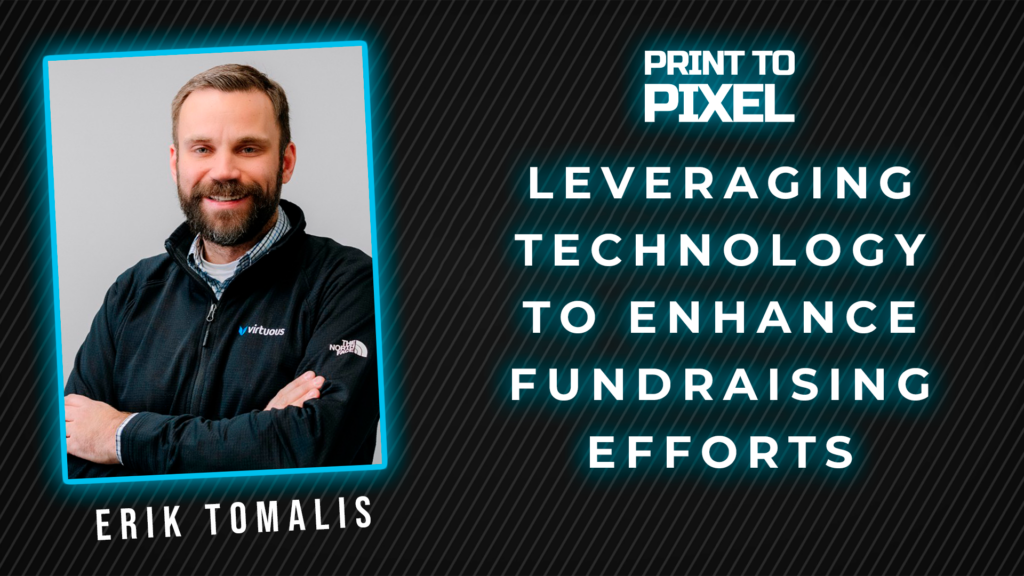
In today’s rapidly evolving landscape, nonprofits face unprecedented challenges and opportunities. Erik Tomalis of Virtuous, their Chief Evangelist and Director of Business Development, recently shared his insights on the Print to Pixel podcast hosted by Dennis Kelly, CEO of Postalytics. With over two decades of experience in nonprofit fundraising and a passion for fostering meaningful donor relationships, Erik sheds light on the importance of innovation, technology, and personalized engagement in driving nonprofit success.
The Erik Tomalis Journey: From Fundraiser to Technology Evangelist
Erik’s career began on the front lines of fundraising, making thousands of face-to-face donor solicitations and raising millions of dollars for causes in healthcare, education, athletics, and more. His passion for connecting donors with meaningful causes led him to Virtuous, a nonprofit CRM and marketing automation platform.
Virtuous isn’t just a tool; it’s a mission-driven company that empowers nonprofits to grow generosity through responsive fundraising. Erik’s transition to Virtuous was inspired by the vision of its founder and CEO, Gabe Cooper, who introduced him to a methodology that resonated deeply. Responsive fundraising, as Erik describes, is more than a strategy—it’s a way to build stronger connections between organizations and their supporters.
The Role of Technology in Nonprofit Success
“Nonprofits are being tasked with doing more with less,” Erik explains. Staff shortages, budget constraints, and donor fatigue are challenges many organizations face today. To address these issues, nonprofits must leverage technology to optimize processes, reduce manual tasks, and focus on what truly matters: building relationships.
One key example is the integration of CRM systems and marketing automation platforms. These tools enable nonprofits to:
- Personalize Communication: Tailor messages to donors based on their unique interests and behaviors.
- Streamline Operations: Automate repetitive tasks, freeing up staff to engage directly with supporters.
- Enhance Impact Measurement: Track and analyze donor engagement to refine strategies and demonstrate results.
The Virtuous Methodology: Responsive Fundraising
At the heart of Virtuous lies the philosophy of responsive fundraising, built on four key pillars:
- Listen: Understand what matters to donors through data insights and direct feedback.
- Connect: Engage donors at the right time with messages that resonate.
- Suggest: Offer tailored next steps, whether it’s making a gift, attending an event, or volunteering.
- Learn: Continuously adapt strategies based on donor interactions and preferences.
Erik likens this approach to the personalized recommendations we’ve come to expect from platforms like Netflix. Just as Netflix suggests shows based on viewing history, nonprofits can use responsive fundraising to offer meaningful opportunities aligned with donor interests.
Breaking Down Silos for Greater Impact
One of the biggest hurdles in nonprofit organizations is internal silos. Marketing, fundraising, and program teams often work in isolation, leading to inconsistent messaging and missed opportunities. Erik emphasizes the need for unified goals and shared KPIs across departments.
For example, while marketing might focus on email open rates, fundraising teams are tracking revenue, and program teams are measuring impact. By aligning these metrics, nonprofits can create cohesive campaigns that resonate with supporters and drive greater results.
Direct Mail Meets Automation
Direct mail has long been a staple of nonprofit fundraising, but traditional methods are no longer sufficient. According to Erik, technology has revolutionized direct mail, making it more personalized, timely, and effective. With platforms like Postalytics, nonprofits can:
- Send highly targeted mailings based on donor behavior.
- Automate the process to ensure timely delivery.
- Integrate direct mail with digital channels for a seamless donor journey.
Erik highlights how automation enables nonprofits to “do more with less” while maintaining the personal touch that donors value. For instance, sending a thank-you note or a follow-up appeal at the right moment can significantly enhance donor retention and engagement.
The Responsive Maturity Model
During his presentation at the Bridge Nonprofit Conference, Erik introduced the Responsive Maturity Model, a five-step framework to help nonprofits scale donor engagement effectively. Here’s a high-level overview:
- Data Foundation: Start with clean, reliable data. Regular updates, such as email appends and NCOA (National Change of Address) reports, ensure accuracy.
- Breaking Silos: Foster collaboration across departments to align goals and strategies.
- Personalization: Use donor data to create tailored messages and campaigns.
- Impact Measurement: Demonstrate the tangible outcomes of donor support.
- AI Integration: Leverage artificial intelligence to enhance decision-making and identify opportunities for growth.
This comprehensive approach empowers nonprofits to build deeper connections with supporters and adapt to changing donor expectations.
The Human Element in Fundraising
Despite advancements in technology, Erik emphasizes that the human element remains central to successful fundraising. “Automation doesn’t replace jobs; it enhances them,” he says. By automating routine tasks, nonprofits can allocate more time to meaningful interactions with donors—whether it’s a heartfelt thank-you call or a face-to-face meeting.
Erik’s favorite moments as a fundraiser often involve the gratitude donors express after making a gift. “That walk from an office to the elevator, where a donor thanks you for giving them the opportunity to support a cause they care about, is priceless,” he recalls.
Building a Culture of Generosity
At Virtuous, the mission is to inspire generosity. This ethos extends beyond their software to the resources they provide, including free eBooks, webinars, and training sessions. Erik encourages nonprofits to embrace best practices and learn from industry leaders to continually improve their fundraising efforts.
One of the standout resources Virtuous offers is their eBook on the Responsive Maturity Model, a detailed guide for organizations looking to enhance their donor engagement strategies. By following this framework, nonprofits can create personalized experiences that foster long-term loyalty and generosity.
Final Thoughts
Erik Tomalis of Virtuous’ journey from frontline fundraiser to nonprofit technology evangelist underscores the transformative power of innovation in the sector. As nonprofits navigate a complex landscape of donor expectations, economic pressures, and technological advancements, the principles of responsive fundraising provide a clear path forward.
By listening to donors, connecting with them meaningfully, and leveraging tools like CRM and marketing automation, organizations can build stronger relationships and drive greater impact. With leaders like Erik and companies like Virtuous leading the way, the future of nonprofit fundraising looks brighter than ever.
For more insights on responsive fundraising and innovative strategies, visit Virtuous or connect with Erik Tomalis on LinkedIn.
About the Author

Dennis Kelly
Dennis Kelly is CEO and co-founder of Postalytics, the leading direct mail automation platform for marketers to build, deploy and manage direct mail marketing campaigns. Postalytics is Dennis’ 6th startup. He has been involved in starting and growing early-stage technology ventures for over 30 years and has held senior management roles at a diverse set of large technology firms including Computer Associates, Palm Inc. and Achieve Healthcare Information Systems.
